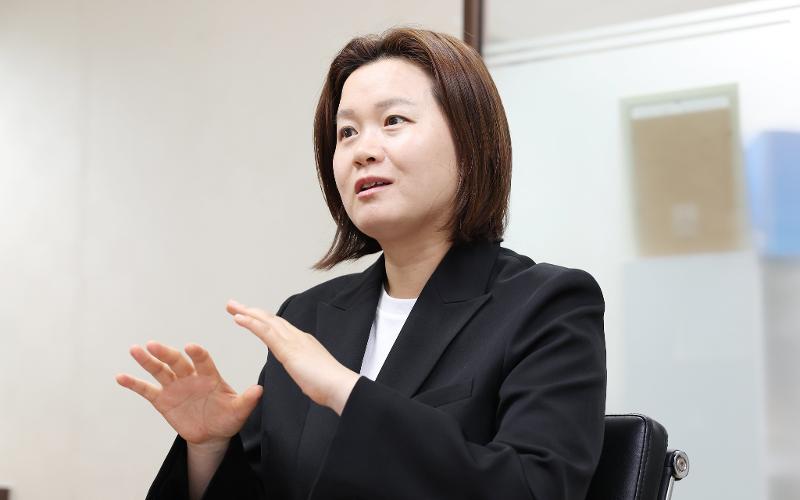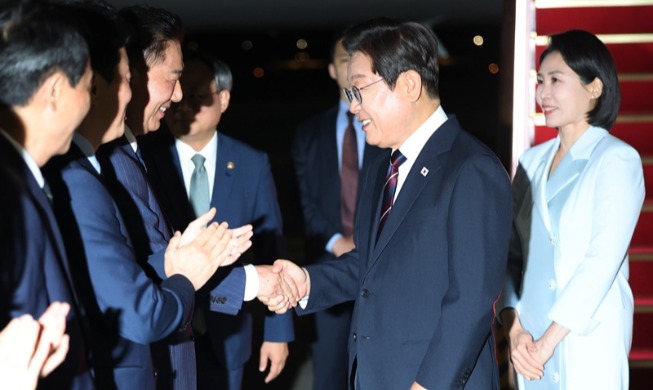- 한국어
- English
- 日本語
- 中文
- العربية
- Español
- Français
- Deutsch
- Pусский
- Tiếng Việt
- Indonesian

Park Joo Hee, the first Korean woman to be appointed to the Executive Committee of the Olympic Council of Asia, on June 13 gives an interview to Korea.net at the International Sports Strategy Foundation in Seoul's Gangnam-gu District. (Lee Jeong-woo)
By Kim Seonah
"Sports are the best form of diplomacy."
Korea.net on the afternoon of June 13 visited the International Sports Strategy Foundation in Seoul's Gangnam-gu District to interview Chairperson Park. The following are excerpts from the interview.
What is your primary role as chair of the OCA's Entourage Committee and member of its Executive Committee?
The Entourage Committee represents the voices of not only athletes but also everyone around them like coaches, managers and medical staff. Its main task is to directly and indirectly cooperate with organizations and help all athletes and staff to work well together, so its focus is to ensure that such voices are conveyed and reflected well.
What specific plans or strategies aim to reflect the voices of athletes and staff in sports policy?
Korea Sports & Olympic Committee President Ryu Seung-min is a former athlete, so he has often spoken on behalf of the athletes. I'm not a former athlete, just someone who majored in sports, but I've met many people related to sports to better understand their roles. And as a woman, I strive to resolve gender issues better.
In your job, what differences in sports culture in Asia have you experienced? What is your main principle in reconciling such differences?
Though the Middle East is part of Asia, it's different and exotic. At first, the region's culture was a little unfamiliar to me, but the most fundamental thing was how to understand its people and how they could understand us. That's most important. I seek to create points of contact by meeting and talking with many people.
What sectors in sports diplomacy can Korea do well in?
Rather than trying something new, Korea should highlight its strengths and promote them to the world. We boast good technology and amazing personnel, plus we're strong in software. So I believe that we should effectively convey our know-how to developing countries and conduct exchanges with countries in Asia, especially with strong regions like the Middle East and India.
Sports are more than simply games. What about the potential for inter-Korean sports exchange and peace building in Asia?
I consider sports the best form of diplomacy. We've had (inter-Korean) ping-pong diplomacy in the past. In any situation during the Cold War, any issue or opportunity created could've turned the tide. We need to do things using a softer approach like culture, arts and sports.
Did you feel any limits as a woman in global sports administration? How did you maintain your leadership at such times?
At first, I felt I lacked opportunities at times because I was a woman. Sports developed under a very male-dominated culture, so women didn't participate much but also lacked many opportunities to do so. Recently, however, gender equality is a huge issue, and I'm trying to offer equal opportunities. Most importantly, be someone you need to be regardless of gender. Expertise opens doors. In this field, having something you can definitely do can be your greatest weapon.
What practical opportunities or paths exist for young women seeking to enter global sports management?
My juniors often ask me what university department they should enter or what subject to major in. I urge them to give clear reasons that they should be hired by the place they want to go. Professionalism, diligence and courtesy are important. Students can volunteer or do internships, and if they find a field they are interested in, they need to send emails, make phone calls and show initiative.
What role model helped mold you into what you are today?
I would say OCA Director General Husain Al Musallam, who also heads World Aquatics (formerly FINA, the world governing body of water sports). In 2007, I became an inspector for the Korea Anti-Doping Agency and entered the international program for doping inspectors at the inaugural Asian Beach Games, becoming Korea's first international doping inspector. That's when I met him, and he has since guided my global career. He has given me every opportunity from the time I was young and inexperienced, and stayed with me while I was building the system in Asia. We still talk daily and consult from beginning to end. He's like family and I'm so grateful to him.
sofiakim218@korea.kr
Most popular
- Military discharge sets stage for reunion of all 7 BTS members
- 'We are back!' BTS Festa heralds hyped return of K-pop phenom
- K-pop streaming on Spotify skyrockets 470-fold in 10 years
- Hallyu gala MyK Festa from June 19 to feature K-pop acts
- President Lee starts G7 schedule via talks with S. Africa, Australia
